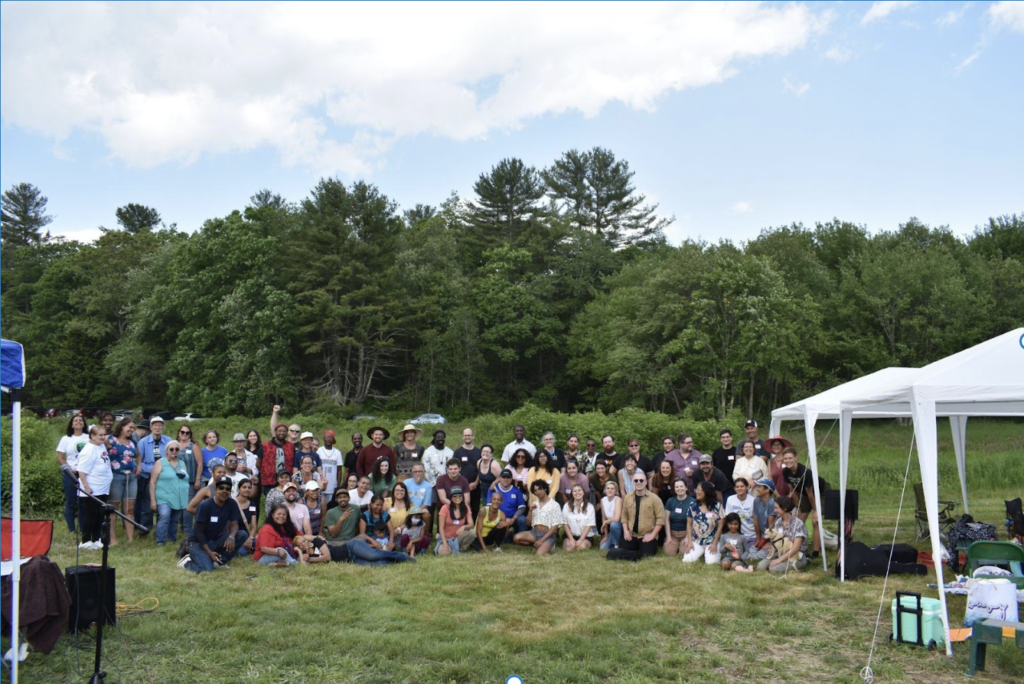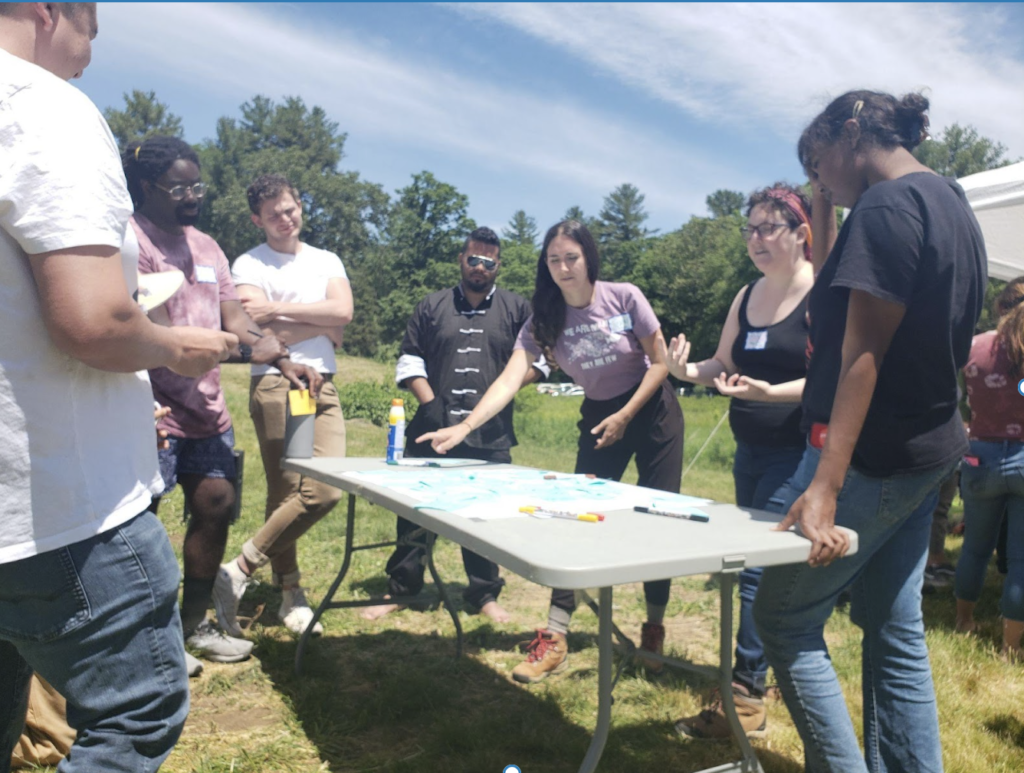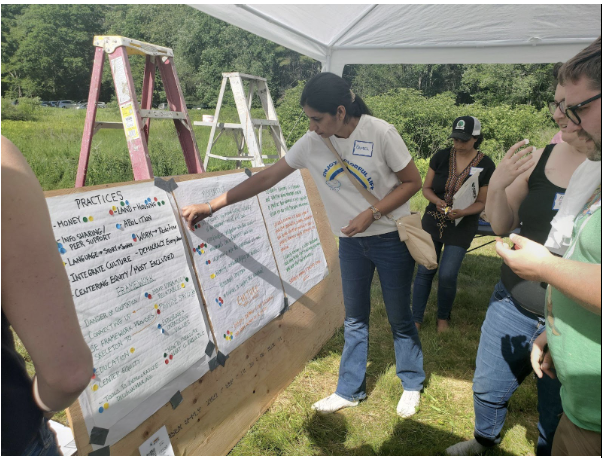Issues & Analyses: Becoming Human -Gathering Solidarity Economies

Participants at the 2022 Massachusetts Solidarity Economy gathering at Global Village in Grafton.
by Dylan Hatch, Erik Lam, and Boone Shear
Organizers couldn’t have hoped for better conditions to host the 2022 Massachusetts Solidarity Economy gathering in centrally located Grafton. Over 100 activists, organizers, workers, students and academics, and community members convened on a large grassy space surrounded by farmland and woods. A cool breeze tempered the heat from the sunny, mostly clear skies. Canopies created meeting spaces and shade for organizations passing out information or selling wares. Live music filled the air, and a large community of dragonflies darted across the sky–the presence of which, as one participant remarked, was a sign of healthy biodiversity. Global Village is a cooperative farm, a retreat center for movement activists, and an organization and land dedicated towards indigenous sovereignty. For those aiming to achieve a just, truly sustainable economy, it was a fitting and inspiring location, keeping us grounded in the knowledge of our shared, relational nature.

Solidarity Economy Overview
Hosted by the Massachusetts Solidarity Economy Network (MASEN) and its sister organization, the Coalition for Worker Ownership and Power (COWOP), the SE gathering was largely informational. On the first day, a featured session was Solidarity Economy 101, facilitated by Hendrix Berry and Emily Kawano that aimed to get participants–both newcomers and SE stalwarts–in a shared headspace. Solidarity Economy (SE) at its most basic is a project to put people and planet over profit. It is simultaneously an idea, a set of embodied practices, and a movement (or, a movement of movements). SE begins with a deep imagination and desire for ways of being that run counter to or are suppressed by the dominant, extractivist economy. It is both anti-capitalist and post-capitalist– anti-capitalist in that it opposes the alienating and exploitative nature of patriarchal racist capitalist modernity and post-capitalist in that it advances practices, values and relations that assemble other economies and worlds.
Working towards solidarity economies, thus, involves a re-thinking and re-working of what constitutes “economy.”. It involves a stance towards economic possibility. Rather than singularly capitalist, the economy is acknowledged as diverse, malleable, and in the making. Non-capitalist–including cooperative and ethical– forms of work, exchange, and consumption exist in the here and now (and have always existed) ready to be organized around and advanced.
For example, alternative forms of exchange and currency can help steer and direct economic activity towards local resilience and community empowerment. Community land trusts decommodify housing, taking it out of the speculative market and, at their most radical, can work as a commons where communities collectively use and care for the land and each other. And, collective forms of production and labor–like worker-owned cooperatives–work against alienation and individualism, enabling workers to decide for themselves how and when to labor– balancing the needs of the business, the workers, and the community. It’s no surprise that worker cooperatives tend to be more just, more resilient, more involved with community and movements, and better for local economies than conventional businesses.
The gathering grounded the SE framework in concrete efforts and initiatives discussed throughout the weekend. Organizations shared what they were up to. And conversations and workshops fleshed out challenges and possibilities for SE. On Saturday, one concurring session discussed the Mondragon Corporation in Spain, the largest assemblage of worker-owned cooperatives in the world, employing roughly 80,000 workers. The workshop facilitator discussed their interviews with about 50 worker-owners of Mondragon and how they incorporated the lessons they learned into their own cooperative in the United States. Some practices included the importance of wage solidarity, the creation of a rotating management committee, and merging with other worker-owned cooperatives. After visiting the Mondragon Corporation, the organizer declared to the group, “They have figured it out. They solved it.”
Solidarity Economy In Massachusetts
In Massachusetts, the cooperative movement and a broader SE politics is very much in the making. On the one hand, the SE activity taking place over the past decade is remarkable. For example, Massachusetts has the third most worker-owned cooperatives of any state, with nearly ⅓ formed in the past 5 years At an organizational level, there are numerous, growing local and regional initiatives aimed towards a post-capitalist politics. And the Massachusetts Solidarity Economy Network (MASEN) is the only such statewide network of its kind.
On the other hand, while there is a ton of energy in and around SE happenings, the movement appears quite modest next to the dominant, extractivist economy. A recurring theme at the gathering was the importance of bringing forward and addressing the many challenges of advancing the work. A particular focus was on the expansion of worker-owned cooperatives, sometimes considered the “backbone” of SE because of the central role they might play in organizing and building collective labor power. Challenges discussed at the gathering included a lack of education regarding cooperatives and SE, a widespread culture of individualism, and financial barriers such as the challenges of securing loans.
Building a Relational Movement
Perhaps even more fundamental for the movement is the important work of building the social relationships and relational culture needed to carry the work forward. The first day opened with an activity in which participants briefly introduced themselves to each other in two-minute intervals, sharing their ideas and investments in SE. This was followed by a reconvening of the larger group and an invitation for participants to propose or lead conversations and workshops. For example, one participant asked how young people can become more involved in the movement. Proposals were followed with break-out groups to discuss the thoughts raised. In between structured activities, there was a feeling of joy, of real enthusiasm for people to just get to know each other on a personal level. People laughed and played or took walks in the woods. Small groups drove into nearby Worcester to visit SE cooperative businesses and organizations. A number of participants stayed through the night, camping out at Global Village.
The second day continued with similar relationship building practices, collective knowledge sharing, and some more intentional reflection and strategy. After thinking through and sharing what brought us to SE politics, organizers Hendrix Berry and Nellie Marshall-Torres gave an overview of the state of the SE in Massachusetts (exciting! growing! much to be done!). This was followed by a “world cafe” activity where, working in small groups, participants discussed different aspects of solidarity economy culture and structure–various hopes, goals, and fears about the movement emerged. Through this expansive and open conversation, participants then prioritized what the movement should focus on in the coming year–top priorities included:
- An attention to and decommodifying of land and housing
- Moving resources and working to ensure frontline communities lead the movement
- Coordination with and integration into movements for social justice and transformation
- Developing more tools to democratize decision making
- Bringing cultures of care into every moment and relationship of SE

These collectively generated priorities reveal the emergence of a Fight and Build solidarity economy politics in Massachusetts. SE involves more than building non-capitalist institutions, like worker-owned cooperatives. It’s about collectively confronting and pushing back against exploitation and oppression. It’s about attending to power within movements and with SE institutions.
Even more, from our perspective, the real, existential hope of solidarity economies is that they can help to create and embody conditions from which workers and communities can truly break free from the dictates of capitalist modernity that shape our minds and bodies, feelings and relations. Worker cooperatives, for example, can work to reshape how work-owners understand and desire themselves in relation to (non) capitalist time and space, and in relation to each other. Solidarity economy, then, is not only an anti and post-capitalist project. It signals the need for a politics of decolonization– defending and advancing ways of being and knowing and doing that are colonized and suppressed by the forces of capitalist modernity.
This solidarity economy graphic below, from the New Economy Coalition, is instructive, suggesting decolonizing knowledge and practices, power-building and collective determination, realizing interdependence with all beings, and revaluing of care-work that can assemble and are constitutive of (and might be in part constituted by/through) solidarity economies.
The SE gathering last weekend was ultimately an exercise in healing and hope. Patriarchal racist capitalist modernity employs numerous devices that materially and psychologically oppress, constrain, and entice–debt, concentration of wealth, state violence of all kinds, the commodification of life. Sharing experiences with and learning from others is a way of healing from this pain and connecting over our shared (divergently, and unequally shared) grief. Indeed, the tone of this weekend was bright and hopeful, uncovering and shining light towards a horizon of liberation. Other economies and other worlds are possible, and there is a growing, empowered movement channeling pain into loving action.
Each edition of Becoming Human will feature an article, reflection, interview, poetry, or other types of expression that engage with a creative community or municipal effort. These will include original features that discuss a local initiative and also stories about efforts in other parts of the world that we might learn from. The growing narratives, relations, and power from which other worlds are being assembled, maybe, can help reorient our hope and desire—and resignation—away from the death drive of white supremacist, heteronormative, capitalist modernity, and towards an open, uncharted horizon of radical egalitarianism and towards the reality that other worlds are in the making or already here. For the full introduction to Becoming Human that appeared in its inaugural column, look here.
Acknowledgements: This column—and the articles cited within—are in dialogue and solidarity with numerous collaborators and comrades including Vin Lyon-Callo, Meredith Degyansky, Penn Loh, Stephen Healy, students in Anthropology 340 – Other Economies are Possible, Anthropology 341 Building Solidarity Economies, Anthropology 597CC Community, Commons, Communism, and the pluriverse of world-making and world-defending efforts, movements, and projects in Massachusetts and around the worlds.
Boone Shear teaches in the Department of Anthropology at the University of Massachusetts Amherst. He is involved with a number of overlapping efforts to imagine, organize around, and expand post-capitalist possibility in Massachusetts.
Dylan Hatch is a student and writer based in central Massachusetts. He studies Social Thought and Political Economy at UMass Amherst, where he recently completed an Honors thesis titled “Reimagining Globalization Through Economic Democracy.” He also researches cooperative development for the Coalition for Worker Ownership and Power and the Center for Economic Democracy.
Erik Lam is a recent graduate of University of Massachusetts Amherst where he studied Economics. He now spends his time working and researching cooperative development alongside Dylan and Boone.
Dylan and Erik were/are a part of Building Solidarity Economies coursework at UMass.
